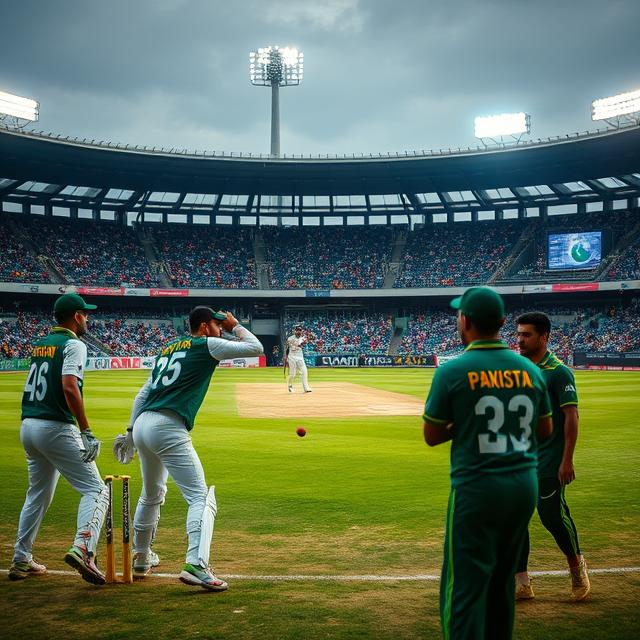Spot Fixing in Pakistan Cricket: A Deep Dive into Corruption

Spot Fixing in Pakistan Cricket: A Deep Dive into Corruption
Pakistan cricket, a sport steeped in passion and tradition, has unfortunately been marred by allegations of spot-fixing. This article delves into this dark chapter, exploring the extent of the problem, its impact, and the ongoing efforts to eradicate this insidious practice.
A Stain on the Game: Spot-fixing, a grave transgression against the spirit of sportsmanship, involves players deliberately manipulating matches for financial gain. It’s a complex issue with far-reaching implications, extending beyond the immediate players involved.
The Genesis of the Crisis: The scourge of spot-fixing in Pakistan cricket emerged in the early 2000s, a time of immense cultural and economic change in the nation. A confluence of factors, including financial pressures on players, the complexities of the gambling underworld, and the often opaque nature of professional cricket management, created an environment ripe for exploitation.
The 2010 spot-fixing scandal, a particularly shocking episode, brought the issue into sharp focus. Numerous Pakistani players were implicated in manipulating key matches, raising serious concerns about the integrity of the game. This scandal sent ripples throughout the cricketing world, highlighting the need for robust anti-corruption measures.
Unveiling the Methods of Corruption
Spot-fixing operates on a sophisticated web of deceit, often involving bookmakers, corrupt agents, and, unfortunately, players themselves. The methods involved can range from pre-planned outcomes of specific deliveries to collusion in crucial match moments. These clandestine deals often transpire in an environment of secrecy, making detection extraordinarily challenging.
The players embroiled in these incidents often face immense pressure, both from external forces and within their own social circles. The financial allure of fixing is often incredibly tempting, especially considering the economic disparities within Pakistan. The lure of quick money, often far exceeding anything they could earn through legitimate means, can be overwhelming.
The involvement of agents further complicates matters. These individuals often act as intermediaries, facilitating corrupt deals between players and bookmakers while remaining out of the direct spotlight. This creates a network of secrecy, hindering detection and enforcement efforts.
The Impact of Spot-Fixing
The repercussions of spot-fixing extend far beyond the players directly involved. Public trust in Pakistani cricket was severely eroded. The image of the national team, so meticulously built over years, was tarnished, and the sport suffered significant reputational damage. It significantly impacted the game’s appeal to sponsors and fans alike.
The economic consequences were also substantial. Sponsors pulled out, and the financial stability of the Pakistan cricket board came under scrutiny. The long-term damage to the sport’s financial health was a considerable blow.
Furthermore, the integrity of the sport itself was challenged. The very foundation of fair play was undermined, shaking the core tenets of competitive sportsmanship. The damage to the moral fiber of the game was, and continues to be, a long-lasting stain.
Cricket Boards and the Fight Against Corruption
The Pakistan Cricket Board (PCB) has undertaken a range of measures aimed at combating spot-fixing. These include improved anti-corruption measures, stricter enforcement protocols, and increased transparency in match-day operations. Educating players, especially younger ones, about the potential dangers of corruption is also a vital element of the preventative strategy.
International cricket boards also play a vital role in this global effort. They share intelligence, collaborate on investigative efforts, and enforce consistent anti-corruption policies across various cricket-playing nations. Stronger collaboration between boards strengthens the fight against match-fixing on a global scale.
Beyond the Headlines: A Long Road to Recovery
The fight against spot-fixing is an ongoing battle. It requires vigilance, transparency, and unwavering commitment from all stakeholders—players, administrators, and fans. Continued efforts to educate players about the consequences of corruption, enhanced financial support, and improved access to mental health resources are all crucial.
Rebuilding trust involves not only the strict enforcement of rules but also promoting ethical conduct and sportsmanship at all levels of the game. This encompasses establishing a culture of accountability, educating future generations about fair play, and providing avenues for reporting potential corruption.
Furthermore, an enhanced focus on the financial well-being of players can help mitigate the pressure that can tempt them towards illicit activities. Providing adequate financial support and avenues for career development can go a long way in dissuading individuals from seeking shortcuts.
The story of spot-fixing in Pakistan cricket serves as a reminder that corruption can have devastating consequences. The fight against this scourge necessitates collective action and an unwavering commitment to the integrity of the game. Pakistan’s continued progress in overcoming these challenges will hinge on the commitment of all involved.
Looking Ahead: The fight against spot-fixing is not just about preventing future occurrences; it’s also about rebuilding trust and restoring the sport’s reputation. Pakistan cricket has the potential to regain its former glory, but only through unwavering commitment to ethical practices.
Conclusion
Spot-fixing in Pakistan cricket has left an indelible mark on the game. The path to recovery is long and arduous, demanding collaboration between various stakeholders and a sustained commitment to ethical conduct. A united front, incorporating increased education, improved player support, and strengthened enforcement mechanisms, is paramount for restoring the game’s integrity and reputation. This must include educating players about the dire consequences of corruption and how to avoid such temptations.